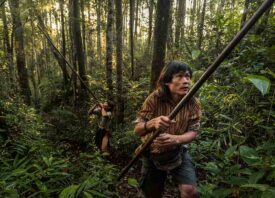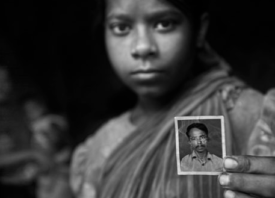Search this site
Meet the Woman Risking Her Life to Protect the Endangered Gibbon


The photojournalist Justin Mott will never forget the first time he heard gibbons sing. He was traveling off the beaten path in the Malaysian jungle, crossing a cable bridge to reach the Gibbon Protection Society Malaysia, now known as the Gibbon Conservation Society, a rescue and rehabilitation center run by Mariani “Bam” Ramli, a wildlife expert with experience working with the endangered primates. He heard them long before he could see them.
These are animals who are meant to live in the wild, singing and swinging in the trees, and once they are healthy enough, that’s exactly where they’ll go. Unfortunately, many gibbons aren’t so lucky. Ramli is battling the effects of deforestation and habitat loss, but at the same time, she’s also fighting another fatal threat: the illegal wildlife trade.

“Gibbons are taken from the wild by poachers and sold as pets,” the photographer explains. “Malaysia has a whole culture of it, with celebrities even posting pictures of their gibbons in different outfits for their Instagram accounts. During the capture itself, the poachers go for baby gibbons. In the process, they will slaughter the other gibbons who will fight to the death to help their kind.” When one baby gibbon is stolen from the wild, ten or more of his or her family members will be killed.
Mott documented Ramli’s life and work as part of his long-term project Kindred Guardians, a testament to people working around the world to protect and rescue animals. Her center is the only one of its kind in Malaysia, and at the time of the photographer’s visit, she and her team were caring for four gibbons, each rescued from the illegal pet trade. Every day, she bottle-fed the youngsters by hand and then brought them to the jungle for “school” so they could learn to swing, climb, and live in the wild.


“It was essential for me to show that while Bam cares for the gibbons tenderly, she is not treating them as pets,” Mott says. “That is exactly what she is trying to avoid and the main reason they end up in captivity.” It’s hard to say goodbye once it’s time for an animal to return to the wild, but, of course, that’s the goal: to carefully wean them off of human contact so they can live autonomously in the jungle, where they are free to sing from the treetops.


Ramli’s work is rewarding, but it’s also been challenging at times. She has received death threats from poachers and wildlife traders, and during Mott’s visit, she was in the midst of a court battle for a permit to run her center. Although she ultimately won in court, she recently had six of her gibbons seized unlawfully by the government wildlife department, the Department of Wildlife and National Parks Peninsular Malaysia, abbreviated PERHILITAN, who are appealing the court ruling in favor of Bam. “It is shameful what they are doing,” Mott says.
If you’d like to help, you can sign this petition urging the safe return of the six gibbons. The photographer is following the situation closely. Until then, he’ll hold onto the animals’ voices in his memory. “Hearing their beautiful songs echoing throughout the forest is one of those magical moments where you feel connected to nature,” Mott tells us. “In addition to their songs, what stands out about gibbons is how similar to us they are. Scientists estimate the gibbon genome as 96 percent similar to humans.”

To help protect these primates, you can make a donation to Ramli’s organization, the Gibbon Conservation Society. You can also visit Justin Mott’s website for more from the Kindred Guardians project and follow him on Instagram at @askmott.

All images and captions © Justin Mott



